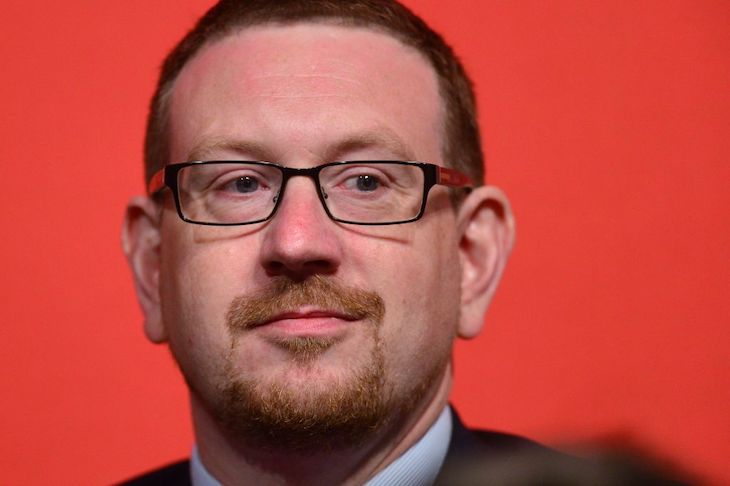Labour MP Andrew Gwynne has been sacked from the government, and suspended from the party, for sending ‘vile’ WhatsApp messages. Gwynne, who reportedly wrote that he hoped an elderly constituent who had complained about bin collections would die, is also said to have made antisemitic remarks and jokes about Diane Abbott. He stands exposed of being a callous bigot. Case closed. Gwynne’s career is over.
If making horrible jokes in private is a sin, we’re all damned
Except, of course, Gwynne – and his Labour colleague Oliver Ryan MP, who was also a member of the WhatsApp group and has been suspended – are not bigots. Yes, their remarks were tasteless and offensive – and they shouldn’t have made them. But these WhatsApp observations were clearly bad jokes, shared among friends (or people they thought were friends).
Gwynne’s downfall is satisfying. This was a man who waded in against Roger Scruton when the eminent philosopher was cancelled after being misrepresented in a New Statesman hit piece. It’s pleasing to see this odious government in any kind of trouble, but there’s a wider principle here that is worth defending.
The truth is that WhatsApp groups are a very particular place, with their own very idiosyncratic customs and behaviours. The WhatsApp group that Gwynne – and another Labour MP, Oliver Ryan, was a member of – was called Trigger Me Timbers, but the tasteless and offensive humour that was shared there is far from unique. I know of so many similarly salty humorous WhatsApp chats (though with less Dad-cringeworthy names). How? Because I’m a member of them. WhatsApp brings out in people the best, or worst, depending on your inclination. But the hard and fast rule is that messages should not be taken out of context.
There is often competition to say the most distasteful and inappropriate thing on any subject. I naively assumed this was a male social phenomenon, or at least where men set the pace, but I’ve discovered this to be far from the case. I’m reliably informed that there are all-female chats with ‘content’ that would scorch your eyebrows off. I’ve also been told that such groups exist in the most unlikely circles and among the most unexpected professions; I’d love to be more specific, but I daren’t. Think of the least likely people to be doing this, and you’ll probably be right. No wonder Labour MPs – and, indeed, probably Tory MPs too – are getting in on the act.
Why has this phenomenon, for saying in private what we wouldn’t dare say in public, arisen? Because the clash between the polite, punctilious public-facing faces we wear and uttering the worst thing you could possibly say in private is funny. WhatsApp chats are often childish, scabrous and scatological, with the added horrible thrill of what would happen if they were made public. Naturally, for full comic force, the transgressions indulged in are usually about the hot button issues of our time, the things you must not say, our 21st century secular blasphemies. That is why Gwynne made the particular jokes he did; not because he is sexist or racist, but because these are the hot button topics of the day. If WhatsApp had been around five hundred years ago, he would’ve been outrageous about God and Henry VIII – and paid for that transgression even more dearly than being ousted from the government.
Such chats are where the steam built up from the pressure of having to conduct oneself in a buttoned up, HR and DEI-ridden culture is vented. This is inevitable, particularly in an age when our speech and behaviour is so minutely scrutinised. In Britain today, nobody can publicly say even slightly unfashionable things without the hordes of cancellation descending on them. Is it any wonder WhatsApp groups are so foul?
In the public sphere, we have to pull the right faces and behave appropriately. We must pretend to notice only the correct things to notice, and pretend to not notice the things that are incorrect to notice. MPs have to do this more than anybody; we see this in the way they instantly fall quiet in the Commons during PMQs when someone starts their question with a sad story about a named voter. The three words ‘My constituent Jane’ (or whoever) are deployed, and red faces drop. The hooting and snorting are switched off, as if a Mute button has been pressed. It’s not that MPs care much about ‘Jane’, but they know of the awful consequences of being spotted laughing along while a constituent’s tale of woe is recited.
Gwynne’s remarks sound shocking with all context removed. But they are clearly not what he actually thinks. It would take a good couple of hours to unpack the lore behind the average WhatsApp chat, the arcane frame built on decades of friendships, in-jokes and cultural reference points, to an outsider. The whole point is that the exchanges happen within a trusted, private circle. Made public they look deranged, unfunny and appallingly tasteless.
But they are not hidden truths, what people really think, and not really even about the subjects of the joke. WhatsApp groups are about smashing social taboos and saying what can’t be said in public.
No wonder Labour MPs – and, indeed, probably Tory MPs too – are getting in on the act
There is something about WhatsApp that induces this. Such bad taste competitions don’t occur at anything like the same rate in spoken, or in-person group conversations. The very act of writing seems to encourage the practice. I’m not sure why. The letters and diaries of old stimulated a similar effect, as Philip Larkin and Joe Orton – and more pertinently here, Alan Clark – could’ve told you.
There’s been a lot of disgust at Gwynne the last few days. But this affair has actually made me feel slightly – very, very slightly – more favourable towards MPs. It’s nice to know that at least some of them aren’t perpetually stuck with that lousy pretend righteousness and those bovine ‘I care’ faces; that behind the scenes they are awful, inappropriate humans like the rest of us. But then, many MPs revel in banging other people up for making jokes, so they should expect no mercy.
The real rotter here is whoever leaked the chat to the Mail on Sunday. That’s low. Gwynne’s trusted circle of friends included someone who turned out to be neither, and there have been whispers that it was inspired by a falling out in local politics.
A former Chief inspector, David McKelvey, has said that Gwynne should be investigated as other WhatsAppers have been, to be consistent and avoid two-tier policing. Hold on. This should be a no-tier matter. Because, obviously, nobody should be prosecuted for remarks made in a private conversation.
After all, if making horrible jokes in private is a sin, we are all damned. Every last one of us. But that is a matter for the recording angels, not for the law. In the likely event that nobody comes to their senses on this issue, MPs should just stop. They should get off WhatsApp, now. And trust nobody. But what a pity if they do.








Comments